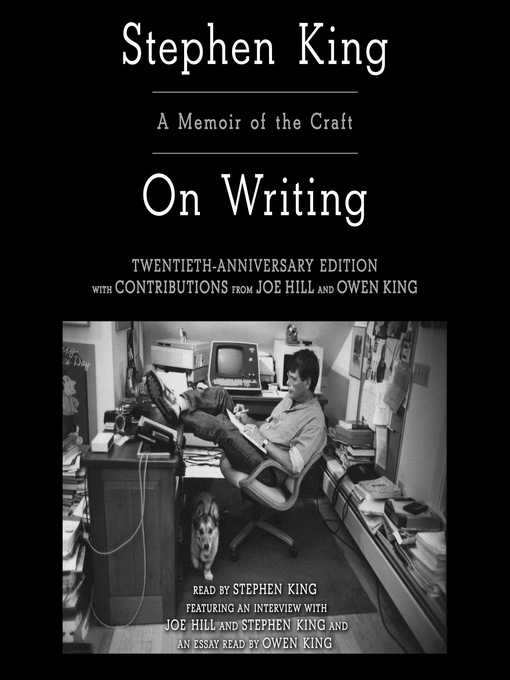
On Writing
A Memoir Of The Craft
کتاب های مرتبط
- اطلاعات
- نقد و بررسی
- دیدگاه کاربران
نقد و بررسی

With this indispensable book, the king of bestsellers intended to put down his thoughts on writing. But after he was run over on a country road in Maine by "one of my own characters," the work turned into a memoir as the author wrote himself back to health. King's life has had a fair amount of horror--even before his near-death experience. His childhood doctor sounds like the town butcher; an early job included picking maggots out of blood-soaked medical laundry (which he seems to have preferred over teaching!). These rare glimpses into King's personal life--as related in his earnest tone and real (thank God) Maine accent--are fascinating, especially his affectionate portrait of his mother. But the real gems are King's tips on writing. He knows his craft, and he doesn't put on any airs. If you write--or want to--get this book. After explaining what's important (including good grammar), the celebrated author says to get down to the business--as he has for the last forty-odd years. E.K.D. Winner of AUDIOFILE Earphones Award (c) AudioFile 2001, Portland, Maine

When Stephen King says "blood" or "lips," his Bangor, Maine, accent drags the "l" into his own dialect. Disguised as a writer's manual, King's latest yarn spills out the story of his life, which happens to revolve around writing. Fans will be eager to hear the master tell where his stories, his dialogue, his characters, and his language began. And, more than in any previous narration, King's energy and emotion radiate around his favorite subject, literature. At the end he relives a recent bone-crushing accident, precipitated by a character right out of one of his own novels. The author/patient recounts his discovery that his passionate mania for writing helps mend both bones and heart. J.A.H. (c) AudioFile 2001, Portland, Maine

Starred review from October 2, 2000
"No one ever asks about the language," Amy Tan once opined to King. Here's the uber-popular novelist's response to that unasked question a three-part book whose parts don't hang together much better than those of the Frankenstein monster, but which, like the monster, exerts a potent fascination and embodies important lessons and truths. The book divides into memoir, writing class, memoir. Many readers will turn immediately to the final part, which deals with King's accident last year and its aftermath. This material is tightly controlled, as good and as true as anything King has written, an astonishing blend of anger, awe and black humor. Of Bryan Smith (who drove the van that crushed King) watching the horribly wounded writer, King writes, "Like his face, his voice is cheery, only mildly interested. He could be watching all this on TV...." King's fight for life, and then for the writing life, rivets attention and inflames admiration as does the love he expresses throughout for his wife, novelist Tabitha. The earlier section of memoir, which covers in episodic fashion the formation of King the Writer, is equally absorbing. Of particular note are a youthful encounter with a babysitter that armchair psychologists will seize upon to explain King's penchant for horror, and King's experiences as a sports reporter for the Lisbon, Maine, Weekly Express, where he learned and here passes on critical advice about writing tight. King's writing class 101, which occupies the chewy center of the book, provides valuable advice to novice scribesDalthough other than King's voice, idiosyncratic and flush with authority, much of what's here can be found in scores of other writing manuals. What's notable is what isn't here: King's express aim is to avoid "bullshit," and he manages to pare what the aspiring writer needs to know from idea to execution to sale to a few simple considerations and rules. For illustration, he draws upon his own work and that of others to show what's good prose and what's not, naming names (good dialogue: Elmore Leonard; bad dialogue: John Katzenbach). He offers some exercises as well. The real importance of this congenial, ramshackle book, however, lies neither in its autobiography nor in its pedagogy, but in its triumphant vindication of the popular writer, including the genre author, as a writer. King refuses to draw, and makes a strong case for the abolition of, the usual critical lines between Carver and Chandler, Greene and Grisham, DeLillo and Dickens. Given the intelligence and common sense of his approach, perhaps his books' many readers will join him in that refusal. 500,000 first printing.

Twenty years after this audiobook came out, it remains as fresh as it was in 2000--a combination of memoir, observations on literature and authorship, craft tips for writers, and an emotional concluding segment on the 1999 near-fatal accident that put King's career on hold. King presents his work in a conversational storytelling voice with excellent timing. This new edition sports two bonuses, both of interest to audiobook listeners. There's a NEW YORKER essay written and read by Stephen's son Owen, explaining how his father paid him to record books on cassette tapes back when most audiobooks were abridged. Also included is an hour-long conversation on writing between Stephen King and his son Joe Hill, which features father and son reading from each other's works. R.W.S. � AudioFile 2020, Portland, Maine

























دیدگاه کاربران